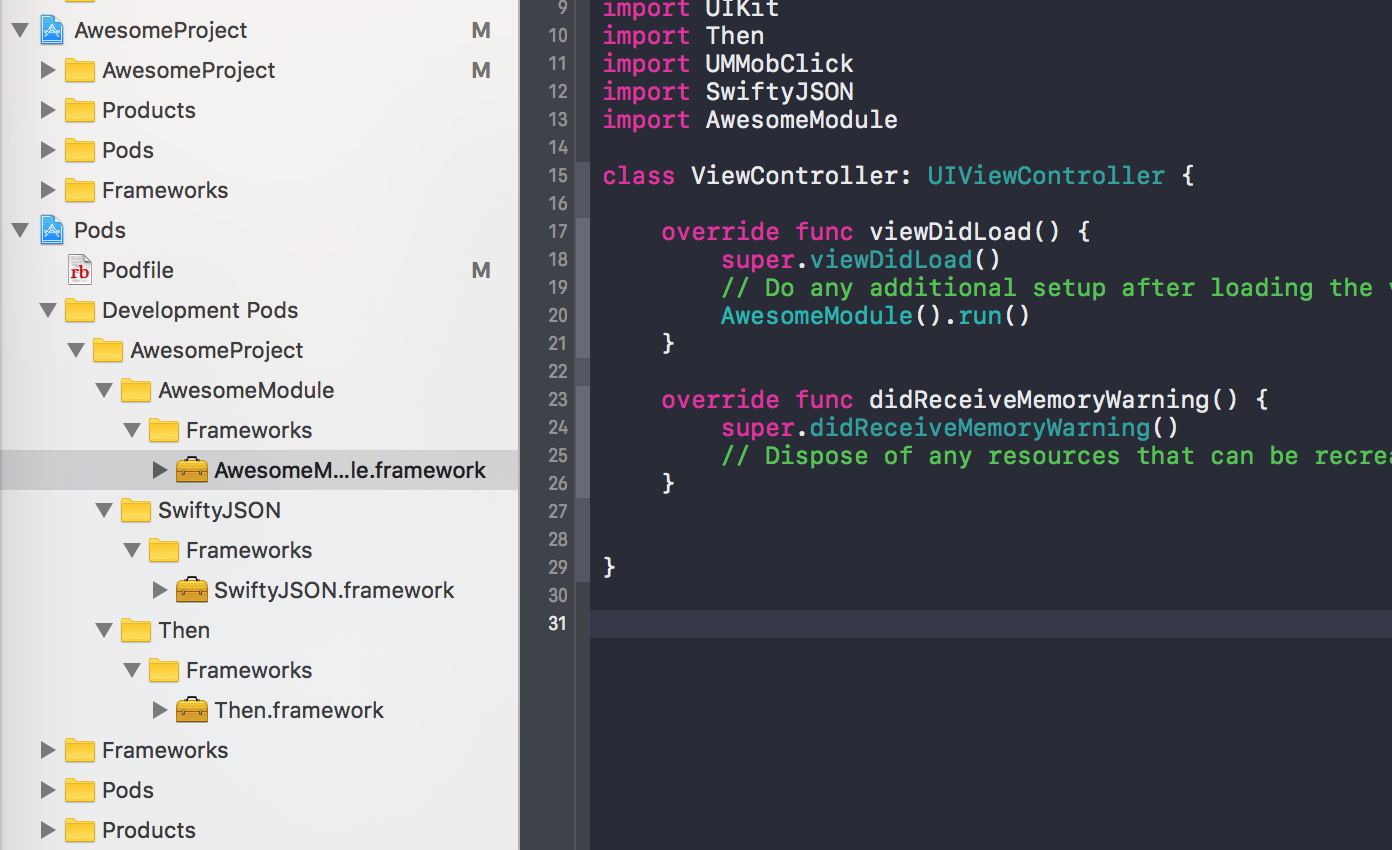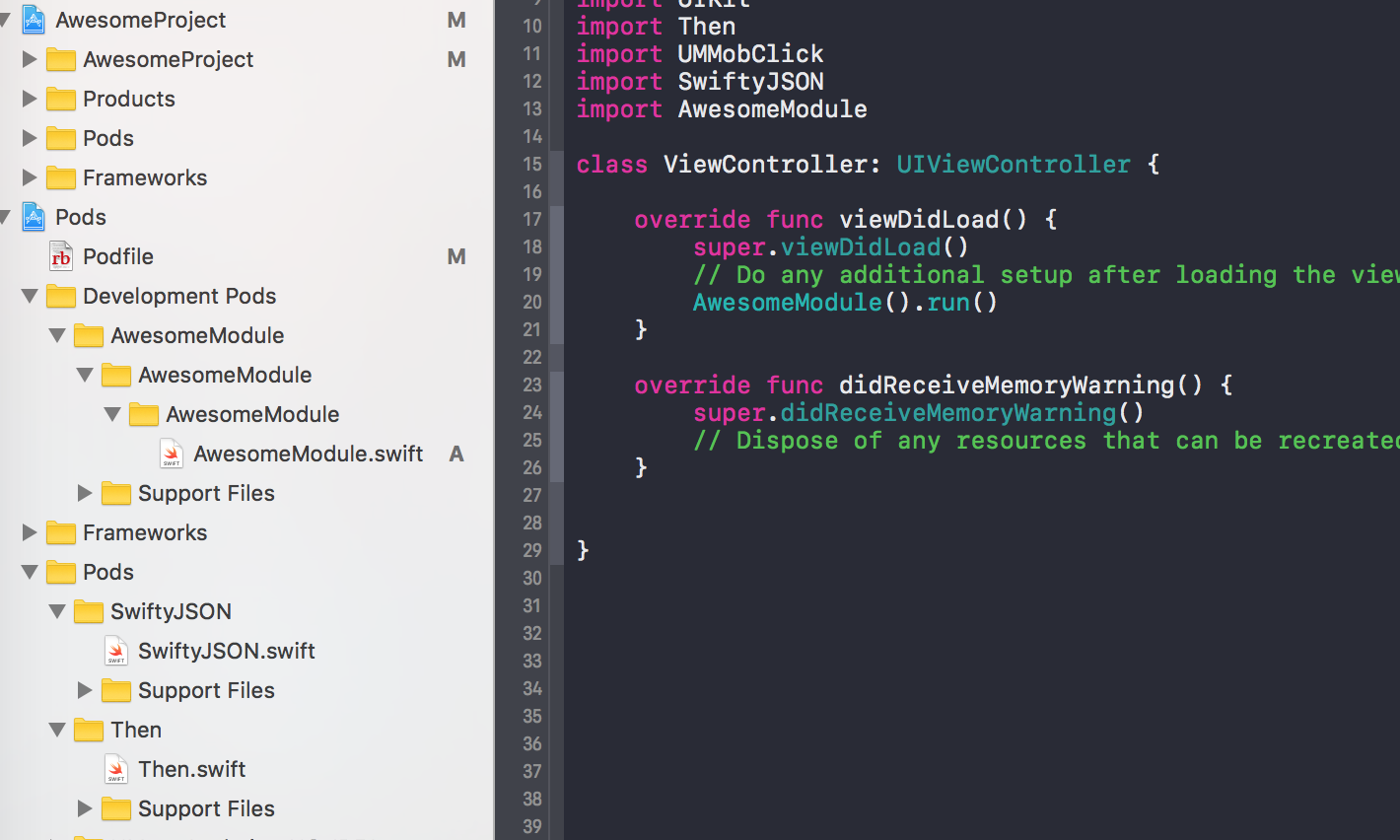基于 CocoaPods 进行 iOS 开发
在阅读本文前,请谨记
Podfile是一段 Ruby 代码(如果您对 Ruby 有一点语法上的了解,这将会非常有帮助,笔者有着一年前的看了 2 小时的 Ruby 基础还是够的),这对于我们定制以下的需求将非常有帮助。
Demo 地址: https://github.com/DianQK/DevOnPods 。
本文有三个部分:
- 创建 module.modulemap ,介绍了如何友好地在 Swift 项目中使用 Umeng 的 SDK
- 使用环境变量,介绍了如何利用 ENV 配置更灵活的场景
- CocoaPods Plugin,标题虽说是 Plugin ,但主要介绍了如何基于 CocoaPods 进行 iOS 开发,特别是将依赖进行 Framework 化,特定第三方库进行 Framework。
先看一下效果。
执行 fastlane pod_generate_frameworks ,将所有第三方库 Framework 化并引用。
项目截图如下:

此时这个项目引用的第三方库都是 Framework 化的了。
接下来执行 fastlane pod_frameworks frameworks:Then,您可以看到项目中仅有 Then 是引用了 Framework :

再执行 fastlane pod_source,你可以看到项目中所有 pod 都引用了源码(原工程):

# 创建 module.modulemap
在项目集成 Umeng 或者 Bugtags 时,按照文档的指示,在 Swift 工程中我们需要创建桥接文件。事实上这不是必须的。我们完全可以创建对应的 module.modulemap ,采用 import UMMobClick 的方式使用。而 Umeng 或者 Bugtags 不像 Fabric 可以直接在 Swift 工程中使用的原因也是如此。
那么如何在 Pods 中增加 module 文件就成了一个问题,总不能手动创建一个,直接移进去。这样会导致 pod install 时可能丢失该文件。
从 Umeng 的 podspec 中可以知道,Umeng 的库是直接 http 形式下载的。
s.source = { :http => "http://dev.umeng.com/system/resources/W1siZiIsIjIwMTcvMDEvMjIvMTFfMDNfMjRfNzM0X3Vtc2RrX0lPU19hbmFseWljc19ub19pZGZhX3Y0LjIuNS56aXAiXV0/umsdk_IOS_analyics_no-idfa_v4.2.5.zip" }
我们创建一个新的 podspec ,并修改这个 zip 中的文件,但这又带来一个问题。如何维护 podspec 和 zip 文件。
podspec 是提供了一个 prepare_command ,我们可以在下载库文件完成时,执行一个脚本。这样就好办了很多:
Pod::Spec.new do |s|
s.name = "UMengAnalytics-NO-IDFA"
s.version = "4.2.5"
s.summary = "UMeng's unofficial Analytics SDK for iOS"
s.homepage = "http://dev.umeng.com/analytics/ios/quick-start"
s.author = { "DianQK" => "dianqk@icloud.com" }
s.platform = :ios, "8.0"
s.source = { :http => "http://dev.umeng.com/system/resources/W1siZiIsIjIwMTcvMDEvMjIvMTFfMDNfMjRfNzM0X3Vtc2RrX0lPU19hbmFseWljc19ub19pZGZhX3Y0LjIuNS56aXAiXV0/umsdk_IOS_analyics_no-idfa_v4.2.5.zip" }
s.vendored_frameworks = "*/UMMobClick.framework"
s.framework = "CoreTelephony"
s.libraries = "sqlite3", "z"
s.requires_arc = false
s.xcconfig = { "LIBRARY_SEARCH_PATHS" => "\"$(PODS_ROOT)/UMengAnalytics-NO-IDFA/**\"" }
s.prepare_command = <<-EOF
mkdir umsdk_IOS_analyics_no-idfa_v4.2.5/UMMobClick.framework/Modules
touch umsdk_IOS_analyics_no-idfa_v4.2.5/UMMobClick.framework/Modules/module.modulemap
cat <<-EOF > umsdk_IOS_analyics_no-idfa_v4.2.5/UMMobClick.framework/Modules/module.modulemap
framework module UMMobClick {
header "MobClick.h"
header "MobClickGameAnalytics.h"
header "MobClickSocialAnalytics.h"
export *
link "z"
link "sqlite3"
}
\EOF
EOF
end
在使用时,我们需要引用对应的 podspec (使用 git path 可能无法达到预期效果)。
platform :ios, '9.0'
target 'Demo' do
pod 'UMengAnalytics-NO-IDFA', :podspec => "https://raw.githubusercontent.com/DianQK/UMengAnalytics-NO-IDFA-Module/master/UMengAnalytics-NO-IDFA.podspec"
end
这样一来我们就可以愉快滴在 Swift 工程中调用 import UMMobClick 了。
# 使用环境变量
既然 Podfile 是一段 Ruby 代码,那么我们就可以在 Podfile 中使用 ENV 环境变量,这将对我们的开发体验有极大改善。比如,对同一个 Target 使用不同的 pod :
target 'AwesomeProject' do
use_frameworks!
case ENV['PODFILE_TYPE']
when 'development'
pod 'Then'
else
pod 'Then', :path => './'
end
end
执行 pod install 将使用 CocoaPods 上的 Then ,执行 env PODFILE_TYPE=development pod install 将使用本地的 Then 。
# CocoaPods Plugin
标准的 CocoaPods 有时不能完全满足我们需求,这时候我们可能要考虑加一些插件了。而这些插件的类型主要有两种:
- Hook
pre_install和post_install,然后搞事情 - 添加一些额外的命令,如
pod try Alamofire
先来看一下 pod install 都做了什么,以 AwesomeProject 为例,我在 Podfile 加入了 Then 这个第三方库:
# Uncomment the next line to define a global platform for your project
platform :ios, '9.0'
target 'AwesomeProject' do
# Comment the next line if you're not using Swift and don't want to use dynamic frameworks
use_frameworks!
# Pods for AwesomeProject
pod 'Then', '~> 2.1'
end
执行 pod install --verbose 得到如下输出:
Preparing
- Running pre install hooks
Analyzing dependencies
Inspecting targets to integrate
Using `ARCHS` setting to build architectures of target `Pods-AwesomeProject`: (``)
Finding Podfile changes
- Then
Resolving dependencies of `Podfile`
Comparing resolved specification to the sandbox manifest
- Then
Downloading dependencies
-> Using Then (2.1.0)
- Running pre install hooks
Generating Pods project
- Creating Pods project
- Adding source files to Pods project
- Adding frameworks to Pods project
- Adding libraries to Pods project
- Adding resources to Pods project
- Linking headers
- Installing targets
- Installing target `Then` iOS 8.0
- Generating Info.plist file at `Pods/Target Support Files/Then/Info.plist`
- Generating module map file at `Pods/Target Support Files/Then/Then.modulemap`
- Generating umbrella header at `Pods/Target Support Files/Then/Then-umbrella.h`
- Installing target `Pods-AwesomeProject` iOS 9.0
- Generating Info.plist file at `Pods/Target Support Files/Pods-AwesomeProject/Info.plist`
- Generating module map file at `Pods/Target Support Files/Pods-AwesomeProject/Pods-AwesomeProject.modulemap`
- Generating umbrella header at `Pods/Target Support Files/Pods-AwesomeProject/Pods-AwesomeProject-umbrella.h`
- Running post install hooks
- Writing Xcode project file to `Pods/Pods.xcodeproj`
- Generating deterministic UUIDs
- Writing Lockfile in `Podfile.lock`
- Writing Manifest in `Pods/Manifest.lock`
Integrating client project
Integrating target `Pods-AwesomeProject` (`AwesomeProject.xcodeproj` project)
- Running post install hooks
- cocoapods-stats from `/usr/local/lib/ruby/gems/2.4.0/gems/cocoapods-stats-1.0.0/lib/cocoapods_plugin.rb`
Sending stats
- Then, 2.1.0
-> Pod installation complete! There is 1 dependency from the Podfile and 1 total pod installed.
整个流程大概如下:
- Preparing 做一些准备工作,主要是下载第三方库的代码
- Running pre install hooks 执行
pre_install - Generating Pods project 创建 Pods 工程
- 处理所有 Pod 需要做的事情,比如添加 frameworks 、资源文件
- Running post install hooks 执行
post_install - Integrating client project 集成到主工程中
pre_install 和 post_install 都可以写到我们的 Podfile 中。
其中的各种参数和属性您可以从 https://www.rubydoc.info/gems/cocoapods/ 中找到,需要注意的是 pre_install 中可能获取不到 pod_project 等信息,第一次 pod 时是没有 Pods 工程的。
那么我们可以在这里做些什么呢,有一个最常见的是设置 Swift 版本:
post_install do |installer|
installer.pods_project.targets.each do |target|
target.build_configurations.each do |config|
config.build_settings['SWIFT_VERSION'] = '3.0'
end
end
end
在这里我们遍历了 Pods 工程中的所有 Target ,设置 Swift 版本为 3.0 。需要注意的是,CocoaPods 是执行完 post_install 才生成 Project ,在这一步可能获取不到 Pods 工程的文件。
# 打 Log
在 CocoaPods 中输出一些内容有两种方式,直接调用 puts ,这只会在 --verbose 下看到输出结果。
调用 Pod::UI.puts 则会在所有场景下有输出结果。
# Hook post_install 拷贝 module.modulemap
那么我们是不是也可以在这里进行一些文件操作呢?当然可以,我们可以在 Umeng 的 modulemap 文件。
以下代码供参考:
post_install do |installer|
sandbox_root = Pathname(installer.sandbox.root)
sandbox = Pod::Sandbox.new(sandbox_root)
module_workaround_root = sandbox_root + 'ModuleWorkaround'
frameworks = []
installer.pod_targets.each do |umbrella|
umbrella.specs.each do |spec|
consumer = spec.consumer(umbrella.platform.name)
file_accessor = Pod::Sandbox::FileAccessor.new(sandbox.pod_dir(spec.root.name), consumer)
frameworks += file_accessor.vendored_frameworks
end
end
frameworks.each do |framework|
destination = framework
root = module_workaround_root + framework.basename + 'Modules'
Pod::UI.puts "Copying #{root} to #{destination}"
FileUtils.cp_r root, destination, :remove_destination => true
end
end
上述是将 Pods/ModuleWorkaround 的 module.modulemap 拷贝到对应的 framework 中。这样一来每当 Umeng 更新了 SDK 后,我们都不需要再修改一份 Podspec 了。此外我们还可以将这个封装成一个 Plugin 使用。这就是 Plugin 的一种类型,Hook 安装前和安装后实际做一些额外的操作。
CocoaPods 中已有的一些插件就是采用 Hook 的方法:
- Rome (opens new window) 不对主工程进行修改,创建 Pods 工程,并生成所有 framworks 到 Rome 目录。
- cocoapods-keys (opens new window) 为工程添加安全设置各种 Key 的支持,当接入一些服务时,我们需要使用对应的 AppKey 之类的东西,cocoapods-keys 会将这些 key 保存到 Keychain 中。这个插件属于比较实用的了,此外您可以阅读一下源码,这个的实现方式非常有趣,它通过 Hook
pre_install,在这里增加一个新的 PodKeys,这个Keys中保存了所有的 AppKey 。
另外一种添加 Pod 命令的也有一些实用的插件:
- cocoapods-deintegrate (opens new window) 移除 Pod
- cocoapods-deploy (opens new window) 加快
pod install
# 基于 CocoaPods 开发,生成 Framework
随着工程变得越来越大,或者是您选择了 Swift ,都会遇到编译时间较长的问题,特别是在选择 Swift 后。
像美团这样大的工程,基本就是采用这个方案,但作为一个小团队,又选择了 Swift ,那就没有时间去构建一套完整的二进制化代码流程了。
笔者在这里找到了还算好用的解决方案。先来谈一下思路:
笔者原本是打算在 pre_install 中搞事情的,将所有的源码形式的 Swift 第三方库全部编译成 framework ,并设置好对应的 vendored_frameworks 。然而笔者依靠着 2 小时的 Ruby 水平,翻看了部分源码和 RubyDoc 对应一些 API 文档,还带着看了一些插件的源码,基本是一无所获。
但也不完全是一无所有,事实上,在 project 引入一个 framework ,主要是配置一下 Build Setting 的 Framework Search Paths ,把对应的 framework 拷贝到运行的 App 中。您可以尝试沿着这个思路完成二进制化的需求。按照这个方案完成的话,我们应当是不需要任何额外的 podspec 了。
那我们退而求其次,创建本地的 podspec ,并引用对应的 framework 。
那么现在的首要解决的问题是,如何创建 framework 。我们可以使用 xcodebuild ,类似 Rome (opens new window) 的方案。直接使用 xcodebuild 需要写各种各样的参数,我们可以考虑使用 Carthage 或者 Fastlane 的 GYM 。
这里我们使用 Carthage 完成这个需求,用 Carthage 可以直接生成 framework 和 dSYM。(当然我们不能去写一个 Cartfile 去拉代码了,我们可以直接 build Pods project)。使用 carthage build --no-skip-current 即可。
那么此时遇到了一个问题,share scheme 。原本这应该是一个很简单的事情,直接将 xcuserdata 中的 scheme 移到 xcshareddata 即可,但 post_install 这里可能还没有生成 scheme 。
CocoaPods 提供了 Xcodeproj 工具,我们可以使用它来修改 project 。在 pre_install 中我们可以直接获取到 Pods 工程 installer.pods_project 。
def generate_frameworks (installer)
project = installer.pods_project # Project.new(installer.sandbox.project_path)
project.recreate_user_schemes(:visible => true)
project.save
project.targets.each do |target|
Xcodeproj::XCScheme.share_scheme(installer.sandbox.project_path, target)
end
carthage_build_log = `carthage build --no-skip-current --configuration Release --platform iOS --project-directory #{installer.sandbox.root}`
Pod::UI.puts carthage_build_log
end
为了方便后面的使用,我在这里创建了一个方法。
创建 scheme ,share scheme ,最后 build 一下。调用了 generate_frameworks 后,Pods 目录下就会增加对应的 Carthage 文件夹。打包出 framework 到这里就完成了。
接下来再去创建一个本地的 Then.podspec 即可。podspec 貌似只能读取当前目录,所以我将它放到了 Pods/Carthage 目录下:
Pod::Spec.new do |s|
s.name = "Then"
s.version = "2.1.0"
s.summary = "Super sweet syntactic sugar for Swift initializers."
s.homepage = "https://github.com/devxoul/Then"
# s.license = { :type => "MIT", :file => "LICENSE" }
s.author = { "Suyeol Jeon" => "devxoul@gmail.com" }
s.source = { :git => "https://github.com/devxoul/Then.git",
:tag => s.version.to_s }
# s.source_files = "Sources/*.swift"
# s.requires_arc = true
s.vendored_frameworks = "Build/iOS/#{s.name}.framework"
s.ios.deployment_target = "8.0"
s.osx.deployment_target = "10.9"
s.tvos.deployment_target = "9.0"
end
虽然我们创建了本地的 podspec ,但当我们更新了某个依赖的版本时,一版我们也无需修改对应的 podspec 。因为这里选择的 framework 是我们使用原 podspec build 出来的 framework 。
最终我们的 Podfile 大概长这个样子:
platform :ios, '9.0'
target 'AwesomeProject' do
use_frameworks!
pod 'UMengAnalytics-NO-IDFA', '~> 4.2'
case ENV['PODFILE_TYPE']
when 'development'
pod 'Then', :path => "./Pods/Carthage"
else
pod 'Then', '~> 2.1'
end
end
post_install do |installer|
generate_frameworks installer if ENV['PODFILE_TYPE'] == 'generate_frameworks'
generate_module installer
end
当选择不加任何环境参数时,第三方库使用的是源码,当使用参数 generate_frameworks 则 build 出对应的 framework 。当使用参数 development 时,则直接使用之前打包的 framework 。
这样一来我们就没有 clean 2 分钟,扯淡(编译)2 小时的事情了。但在开发时,我们可能又需要调试的需求,好在 CocoaPods 即将支持 dSYM 的设置。您可以在 Issues 1698 (opens new window) 中了解更多。
本文大部分的内容都已经完成,最后我们还可以做一些额外的事情再改进一下这个流程,以及一些额外的 Tip。
当基于上述情况开发时,我们的 Podfile.lock 会频繁地变动,我们可以考虑在 Podfile 做好版本控制,或者使用 Danger (opens new window) 监管 PR 中 Podfile.lock 的变动。关于 Danger 相关内容您可以从 使用 Danger 提高 Code Review 体验 (opens new window) 了解到基本内容。
上述方案中,可能有一些地方比较尴尬,我们将一些需要保留到 Git 中的文件放到了 Pods 中,写好 .gitignore 可以解决这个问题,但执行个 rm -rf Pods,顺便还 merge 到了主分支,这还是略尴尬了。
我们还可以考虑把这些移出来,放到项目的根目录中。但这样可能会在根目录有一堆的 podspec ,这有些不友好。但 podspec 中 vendored_frameworks 可以放数组啊。大致如下,这个 podspec 放到根目录即可。
Pod::Spec.new do |s|
s.name = "AwesomeProject"
s.version = "1"
s.summary = "Use Pods Demo"
s.homepage = "https://github.com/DianQK/DevOnPods"
s.license = { :type => "MIT", :file => "LICENSE" }
s.author = { "DianQK" => "dianqk@icloud.com" }
s.source = { :git => "https://github.com/DianQK/DevOnPods.git",
:tag => s.version.to_s }
s.ios.deployment_target = "8.0"
s.vendored_frameworks = ["Pods/Carthage/Build/iOS/Then.framework", "Pods/Carthage/Build/iOS/SwiftyJSON.framework"]
end
# 拆分 spec
我们还可以再多做一些,使用 Subspecs :
Pod::Spec.new do |s|
s.name = "AwesomeProject"
s.version = "1"
s.summary = "Use Pods Demo"
s.homepage = "https://github.com/DianQK/DevOnPods"
s.license = { :type => "MIT", :file => "LICENSE" }
s.author = { "DianQK" => "dianqk@icloud.com" }
s.source = { :git => "https://github.com/DianQK/DevOnPods.git",
:tag => s.version.to_s }
s.ios.deployment_target = "8.0"
['Then', 'SwiftyJSON'].each do |name|
s.subspec name do |sp|
sp.vendored_frameworks = "Pods/Carthage/Build/iOS/#{name}.framework"
end
end
end
这样一来使用的时候就变成了:
target 'AwesomeProject' do
use_frameworks!
pod 'UMengAnalytics-NO-IDFA', '~> 4.2'
case ENV['PODFILE_TYPE']
when 'development'
pod 'AwesomeProject/Then', :path => "./"
pod 'AwesomeProject/SwiftyJSON', :path => "./"
else
pod 'Then', '~> 2.1'
pod 'SwiftyJSON', '~> 3.1'
end
end
虽然多了几行,但感觉似乎更清晰一些了。这也更方便我们管理各种库的依赖,特别是当项目的代码也放到 Pods 中时,这样管理会显得特别有力。
# 指定使用 Framework
比如,我们可以指定哪些库用源码,那些库直接用 framework 。
target 'AwesomeProject' do
use_frameworks!
pod 'UMengAnalytics-NO-IDFA', '~> 4.2'
framework_pods = []
framework_pods = ENV['FRAMEWORK_PODS'].split(",") if ENV['FRAMEWORK_PODS']
development = false
development = ENV['PODFILE_TYPE'] == 'development' if ENV['PODFILE_TYPE']
if development || framework_pods.include?('Then')
pod 'AwesomeProject/Then', :path => "./"
else
pod 'Then', '~> 2.1'
end
if development || framework_pods.include?('SwiftyJSON')
pod 'AwesomeProject/SwiftyJSON', :path => "./"
else
pod 'SwiftyJSON', '~> 3.1'
end
end
当我们想使用 Then 的 framework 时,只需要执行 env FRAMEWORK_PODS=Then pod install 。
# build 指定 Framework
我们已经完成了几乎所有的事情,但还差一个,build 指定 Framework 。毕竟一次 build 全部依赖是一件非常痛苦的事情。
Carthage 在使用了参数 --no-skip-current 后,似乎只能 build 全部 share scheme ,既然这样我们可以简单地将不需要 build 的库不 share 。
这里有两种比较合适的做法,在 generate_module 方法中进行过滤,或者对不想 build 的库,直接使用本地的 spec ,这样就不会在 Pods 中生成对应的 Target 了,自然也不会去 build 这个库。
我们采取第二种方案,第一种需要额外做一些事情,删除 share scheme ,CocoaPods 不会主动删除 share scheme 。
target 'AwesomeProject' do
use_frameworks!
pod 'UMengAnalytics-NO-IDFA', '~> 4.2'
framework_pods = []
framework_pods = ENV['FRAMEWORK_PODS'].split(",") if ENV['FRAMEWORK_PODS']
development = false
development = ENV['PODFILE_TYPE'] == 'development' if ENV['PODFILE_TYPE']
build_pods = []
build_pods = ENV['BUILD_PODS'].split(",") if ENV['BUILD_PODS']
build_all = true # dev 下忽略 build all 参数
if ENV['PODFILE_TYPE'] == 'generate_frameworks'
build_all = build_pods.length == 0 # 等于 0 则 build all
Pod::UI.puts "Build all" if build_all
Pod::UI.puts "Build include #{build_pods}" if !build_all
end
if (development || framework_pods.include?('Then')) || !(build_pods.include?('Then') || build_all)
pod 'AwesomeProject/Then', :path => "./"
else
pod 'Then', '~> 2.1'
end
if (development || framework_pods.include?('SwiftyJSON')) || !(build_pods.include?('SwiftyJSON') || build_all)
pod 'AwesomeProject/SwiftyJSON', :path => "./"
else
pod 'SwiftyJSON', '~> 3.1'
end
end
添加一个 BUILD_PODS 环境变量,当处于 generate_frameworks 的时候,build 对应的库。
以上方案还有一个小的缺陷,pod install 被用来 build framework 了。也就是说当 pod install 后可能还要再一次的 pod install。
比如我们想使用 Then 的 framework ,就需要先 env PODFILE_TYPE=generate_frameworks BUILD_PODS=Then pod install,再执行 env FRAMEWORK_PODS=Then pod install。
这个问题,结合 Fastlane 是个不错的选择,还免去了每次都要敲一下 env 。
以上都只提到了引用第三方库,其实我们的代码也是类似的道理,创建好对应模块的工程,采用 CocoaPods 管理。示例项目中的 AwesomeModule 就是这样做的。
写到最后我们似乎漏了一件事情,pod update,在 update 时,build 新的 framework ,甚至是对于 pod install 中对 framework 进行 cache 。结合 CocoaPods 的文档和 Ruby 大法,这应该也不是一件非常复杂的事情。
# 总结
我们通过对修改 podspec 和 Podfile 达到了很多我们需要的功能,增加 modulemap 、通过 ENV 配置不同依赖、通过 Hook 配置项目引用源码还是 Framework 。
事实上,在 https://www.rubydoc.info/gems/cocoapods 和 https://guides.cocoapods.org 中还有很多内容值得去看, 比如 https://guides.cocoapods.org/using/the-podfile.html 、https://github.com/artsy/eigen/blob/master/Podfile 、https://github.com/CocoaPods/CocoaPods/tree/master/examples ,这些通常能解决您在使用 CocoaPods 遇到的绝大多数问题。